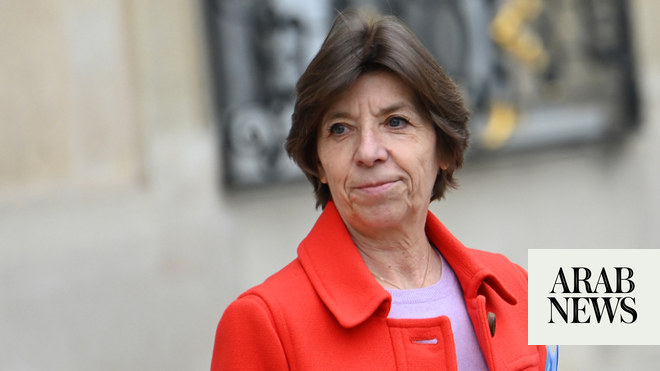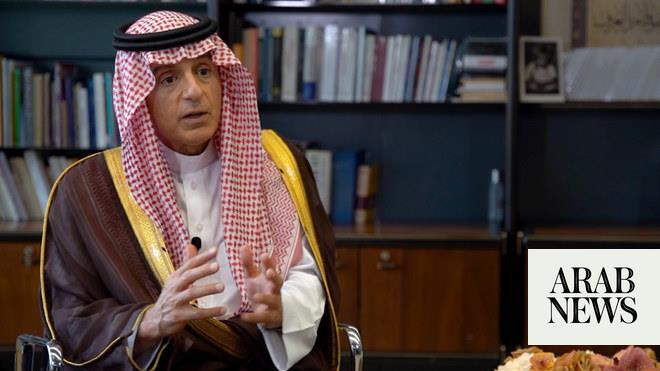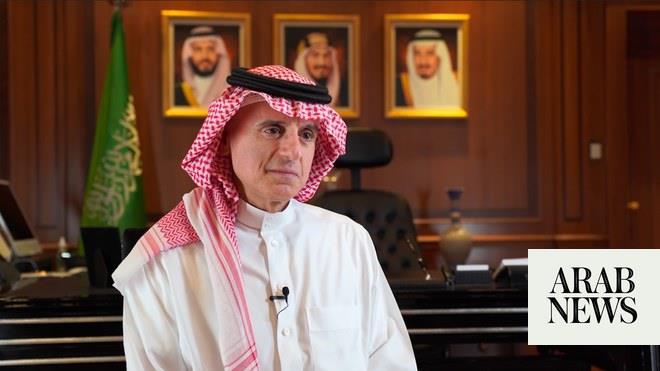
Catherine Colonna also addressed anti-French anger in its former African colonies, blaming Russian propaganda
She was speaking shortly after the overwhelming adoption of an EU resolution calling for Moscow to leave Ukraine, and for a just and lasting peace
NEW YORK: All the woes that many countries in the Global South are faced with today, from rising energy prices to food insecurity, are entirely due to the war waged by Russia in Ukraine, French Minister of Europe and Foreign Affairs Catherine Colonna told Arab News.
One year on since the war started, many smaller states are more vulnerable than ever, and feel that they have been left to their own devices in the absence of a functioning international order.
According to the UN, over 350 million people in 79 countries are food insecure and do not know where their next meal will come from.
Alienated and aggrieved, many developing countries feel that the war in Ukraine and the West’s rivalry with China have become a distraction from pressing issues that are dogging them such as debt, climate change, and the effects of the COVID-19 pandemic.
The West’s unprecedented sanctions against Moscow are being blamed for the high economic price that is being paid in many countries.
However, Colonna denied that the West is responsible for any action that is harming the Global South.
“Let us be clear about this,” she told Arab News. “We aren’t doing any actions that are harming countries of the South. We’re making every effort, like the tons of grain exported from Ukraine, to ensure that those countries have fertilizer and grain.
“On the other hand, yes, it’s Russia’s war that’s (blockading) the Black Sea, (which) has created tension on the food market. And in general, it’s the Russian war that has put tension on energy prices too. So the explanations are simple. We need to recall this. It’s entirely Russia.”
In June this year, France is set to host an international conference on a new global financial pact aimed, in the words of President Emmanuel Macron, at taking stock “on all the means and ways of increasing financial solidarity with the South.”
Colonna said the summit will aim to “build a new contract with the North and the South” in order to facilitate the access of vulnerable countries to the financing they need to address current and future crises.
She added that such a financial pact will allow “the most vulnerable countries (to) face up to their climate obligations and more broadly speaking, (will) give them the means required to develop in a harmonious and democratic manner.”
Colonna was speaking in New York soon after the UN General Assembly overwhelmingly adopted a resolution marking the war’s first anniversary and demanding that Russia leave Ukraine and stop fighting.
There were 141 votes in favor and 32 abstentions. Six countries joined Russia to vote no: Belarus, North Korea, Eritrea, Mali, Nicaragua and Syria.
Colonna told the gathering: “Russia is trying to convince some of you that its attempts to disrupt the world order and impose an order based on force will work in their favor.
“The facts are clear: Russia and Russia alone wanted the war, and its war is putting global food security at risk, especially in the most vulnerable countries, just as it is having a negative impact on most of the world.
“No more war, no more blockades, no more tension on food or energy. (Russia) can and must stop, starting tomorrow.”
Meanwhile, for a multi-layered variety of reasons, anti-French sentiment has been on the rise in France’s former African colonies, from Mali to Burkina Faso and the Central African Republic.
While France has been attempting to create a sea change in its relations with African countries, Russia’s influence has been expanding, driven by Moscow’s ambition to expand its foothold on the continent, especially since it launched its invasion of Ukraine.
Colonna dismissed the opinion that Russia has succeeded in supplanting France or any other European nation in the Sahel, saying the fact that the majority of those nations voted in favor of Thursday’s resolution illustrates that.
Asked by Arab News whether she understands the anger and frustration that some African countries are feeling toward the former colonial power, she laid that frustration at the feet of Russian propaganda.
“To answer that question, I think that we need to look at parallel realities, the manipulation of information, and the underground maneuvers of Russia and some of their partners who are already subject to sanctions,” she said.









